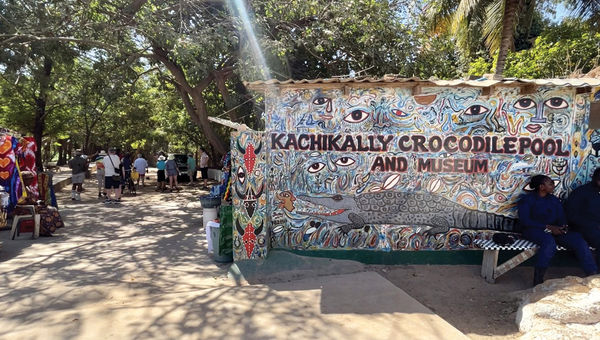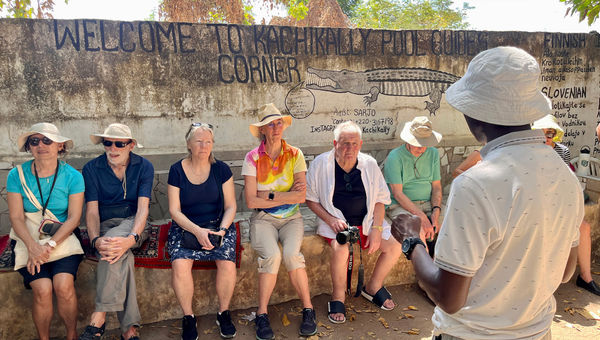Indiana Jones often found himself in precarious situations, whether he was locked in a pit of snakes, overtaken by creepy crawlers in a deadly booby trap or on the receiving end of a passionate slap from a jilted former flame.
But one scenario to have eluded the famous fictional archeologist was finding himself in a sacred park surrounded by dozens of West African crocodiles -- a scenario I'm proud to say that I successfully survived on my seven-night river cruise on the Gambia River with Variety Cruises.
And unlike Jones' brushes with disaster, my visit to Kachikally Crocodile Pool and Museum did not feature any kind of harrowing escape and instead only fueled my desire to return to the unique wildlife and community sanctuary.
Located in Bakau, a town just outside the capital city of Banjul, Kachikally is a unique place to visit in Gambia. And as the name suggests, there are many, many crocodiles that live there.
The park is home to more than 80 West African crocodiles of varying sizes and ages, with some as old as 76, measuring 8 to 10 feet in length and weighing as much as 1,000 pounds.

The colorful entrance to Kachikally in Bakau, Gambia. Photo Credit: Nicole Edenedo
While one might picture a pool enclosure that houses these dozens of crocodiles, complete with clearly marked barriers that keep guests on one side and the crocs on the other, there's none of that at this park.
Kachikally's claim to fame among tourists is that it is a completely open park where the crocodiles roam free, walking along the same footpaths or grabbing the same spots of shade as visitors do.
This means moving through Kachikally is a task that needs to be met with caution, lest one accidentally steps on a croc's tail or trips over the more dangerous end of the reptile -- its snout. So running through the park, a relatively small outdoor grove property, is definitely discouraged. (And if your clients are like me, they'll have to fight the urge to head for the hills every time they see a croc move.)
Tourists can actually pet the crocodiles they encounter at the park, with guidance from the park's staff, of course.
River cruise editor Nicole Edenedo toured Kachikally Crocodile Pool during a call on Variety Cruises' West Africa river itinerary, which operates in part on the Gambia River.
Moses Bajo, Kachikally's spokesperson and the devoted caretaker of the crocs, said it's these aspects that have made Kachikally a popular tourist attraction in Gambia.
"I think a lot of people are very nervous because most people wouldn't expect to see crocodiles free and out like this," Bajo said. "Most people from Western countries are used to seeing a crocodile behind the glass. So to come out and see them out like this -- people always have the same question: Are they real? And I have to make sure that they know these are real."
Bajo even demonstrated for me how he proves that: He gently pinched the tail of the crocodile we were crouching next to, which made the big guy wiggle. (Sure enough, yet again I had the urge to get up and run away before remembering that probably wouldn't be the best idea.)
"We're as close as you can get with the crocodiles," Bajo said, "and if it's possible here, why not take the chance to touch the crocodiles?"

Bajo gives Variety Cruises guests instructions on how to interact with the reptiles. Photo Credit: Nicole Edenedo
The healing powers of the pond
Even more interesting than Kachikally's status as a tourist destination is its centuries-long history as a sacred place.
"The crocodiles are part of the attraction for tourists, but this place is -- and has always been -- a sacred pond," Bajo said. "That's why we preserve it."
Kachikally, Bajo said, is over 300 years old. Water from the pool that the crocodiles use are said to have healing powers, especially for women and couples struggling with fertility issues. Bajo explained that women having difficulty conceiving will come to the park, sometimes with a kind of offering in hand, and ask for water that is taken from the crocodile pool that they then use to bathe with in facilities at Kachikally.
According to Gambia's National Centre of Arts and Culture, people also come to Kachikally for problems and ailments other than fertility issues, including those looking to reverse misfortune in business and parents seeking protection for their children.
"Spiritually, it's very powerful -- that's why we call it a healing power," Bajo said. "Women come here to use the water from the pool. Couples that have been struggling to have babies wash their body with the water, and it helps. We have evidence that it helps."
No matter why anyone visits Kachikally, Bajo said, it's a great experience for everybody, and a good thing for this country, too, "because it markets Gambia anywhere you go; people will say, 'We went to Gambia, and there's this place where you can touch crocodiles,' and their friends want to come."